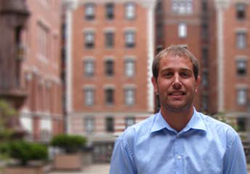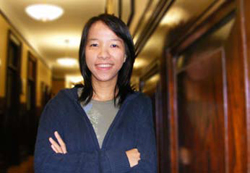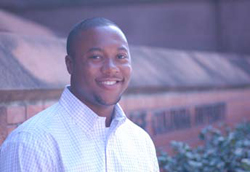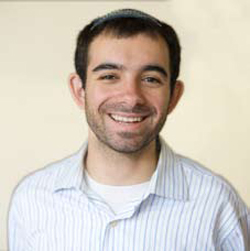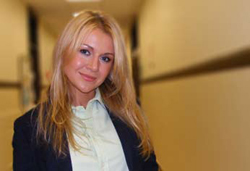The Journey Begins
Five of TC's newest students discuss their hopes and dreams
Andy Levine
Andy Levine got his first glimpse at educational inequality in high school. His school in Fresno , California
“There are reasons and factors leading to these differences—issues of race and class and opportunity,” says Levine, 25, whose calm, warm manner turns serious when discussing matters close to his heart, such as inequality.
As an undergraduate, Levine studied inequality while majoring in sociology at the University of California at Davis
With two educators as parents, Levine might have chosen the classroom as a career venue, but he realized he wanted to approach education in a different way. For the past three years, he’s worked in community engagement at the San Francisco
A need to “get back to school” and have a broader foundation beneath him brought Levine to TC, where this fall he is beginning his master’s degree in sociology and education. He chose TC because he heard it was “less ivory tower and more hands-on” than other schools and because the sociology and education program “seemed about as close as a mission fit as there could be.”
Levine has also come to the conclusion that a more holistic approach is required to achieve lasting change in education. He cites such models as Geoffrey Canada’s Harlem Children’s Zone that combine educational, social and medical resources. “Education is the most critical piece,” he says, “But it can’t be the only piece in this equation. It has to be viewed as one piece of the puzzle.”
As for the future, the possibilities are wide open, Levine says. For now, he’s still working part-time at New Leaders for New Schools’ New York City
“I feel because of the current administration and increased interest and innovation, we are on the cusp of a real movement in this work of education and community organization. My goal is to be on the front lines.”
Trinh Minh Phuong
It was a shocker. Trinh Minh Phuong had always been a stellar student, diligent and hardworking—going beyond what was required of her in class. But in the eighth grade in her native Vietnam
“I thought I didn’t have to get that grade because I was quite good at English,” Trinh recalls. “It was a kind of small event but, you know, for a child who is competitive, it’s a big thing.”
More than a dozen years later, Trinh is now perfectly fluent in English, and thanks to a Fulbright fellowship, she’ll spend the next two years at Teachers College as a student in the master’s degree program in Teaching English to Speakers of Other Languages (TESOL) learning the latest techniques on how to teach the language.
Trinh grew up in Hue , which was once the imperial capital of Vietnam
She eventually won a scholarship to study at the University of Canterbury in Christchurch , New Zealand College of Foreign Languages at Hue University United States
When she got word she was on the short list, she was in Belgium
TC was her dream school, she says, but she didn’t think she’d get in. Now, she’s embarking on the next phase of her education, one she hopes will eventually lead to a Ph.D.
“Life is full of twist and turns,” Trinh says. “You never really know what is going to happen next. I’ve never been to America
Artesius Miller
As an undergraduate at Morehouse College , Artesius Miller flirted with careers in finance (summer internships on Wall Street and in Chicago ) and acting (membership in the Screen Actors Guild and doing a few films in his hometown of Atlanta
“I come from a background of educators. My grandmother was a teacher, my uncle was a teacher back in a school in Gary , Indiana , and I also have other relatives in the Midwest who are educators. So I've always had this interest in going into education.”
It’s little surprise that Miller, 22, is a beneficiary of the Gates Millennium Scholarship program for minority students with high academic and leadership promise. He has always kept many balls in the air and excelled at all of them. While majoring in economics, leading the Morehouse Business Association, and acting in college, he volunteered weekly in Atlanta Bronx Lab School , serves as a graduate assistant in the admissions office at TC and teaches on Saturdays at a charter school in Brooklyn .
As a teacher, Miller expects to draw on his acting and entertainment skill, but he believes play-acting alone won’t begin to get him by. “Children can easily read adults. If they can read that you don’t necessarily want to be there to help them succeed, you will notice that in their behavior and their coursework. If a teacher’s motivation for coming is just to do this for a year or two just to get by, then I would say that it’s not a good idea.”
He also plans to draw on his economics background. Miller believes the subject is not taught often enough, including in high school. Students should graduate from high school ready not only to earn money, but to “spend and save money,” he says. “I walk into my classroom with a smile on my face, just because I know some day that I can become a great educator.”
Zev Eleff
Zev Eleff sees a “great interplay” between the history of education and the history of Jews in the New York City and the United States Israel , and is a graduate of Yeshiva University
“Looking at the enrollment and what was going on at, for example, the Jewish Theological Seminary, the flagship institution of the Jewish Conservative movement, as well as at Washington Heights and Yeshiva University
On the other hand, Eleff says, “American Jews have been very much in the same melting pot as other immigrants, at least to my mind, as Irish Americans, as Germans who came across at the beginning of the twentieth century. Looking at the education of Jews after they came to America through Ellis Island is a study of immigrant education, which is a large part of the scholarship of the history of American education.”
Eleff arrived at TC already a published scholar. While at Yeshiva, he published Mentor of Generations: Reflections on Rabbi Joseph B. Soloveitchik, a volume of remembrances and essays about the American Orthodox rabbi and philosopher; and Living From Convention to Convention: A History of the NCSY, a global organization for Jewish youth.
At Yeshiva, he majored in history and Jewish history and wrote his honors thesis on the history of the campus newspaper, The Commentator, for which he also served as Editor-in-Chief. He is at TC as a Wexner Fellow-Davidson Scholar, a fellowship funded by the Wexner Foundation that trains Jewish professional leaders. While at TC, he is also studying for rabbinical ordination at the Rabbi Isaac Elchanan Theological Seminary, an affiliate of Yeshiva University , and teaching modern Jewish history to 12th graders at the Yeshiva University High School
“It became a no-brainer that I had a strong affinity and devotion toward the history of education,” Eleff says. He is currently in a 30-credit master’s program but says that he might pursue a doctoral degree. “There’s no argument from anyone that Teachers College is really the hub and center of both the cutting-edge methods of educational study—and some of the most traditional. And one of the most traditional is certainly the history of education. I am very fortunate to be able to learn from tremendous scholars at Teachers College.”
Monika Pekala
Monika Pekala is surely the only student in TC's entering class who can lay claim to being inspired to pursue her educational dreams by former supermodel Christy Turlington. Pekala herself has been a fashion model for the past decade.
She put herself through New Jersey ’s Kean University
“Working with people from diverse backgrounds in many different settings—this is what modeling and education have in common,” says Pekala, a Polish native whose visa came courtesy of the famous Ford Modeling Agency.
Pekala came to the United States
The impetus to enter graduate school came from Turlington, the longtime face of Calvin Klein and Maybelline and a graduate of New York University
More than a year ago, Pekala settled on attending TC’s Counseling Psychology Program and took a job as a teacher of English as a Second Language at Irvington High School in New Jersey
She still has a few modeling accounts, but these days she’s busy working at Irvington during the day and attending TC at night. The future is unclear.
“At this point, I’m still open to different career paths, but the area I want to target is the immigrant population, its mental health and wellness,” Pekala says. “Counseling is still a relatively new concept in some foreign populations. I want to help these families with issues involving marriage and self-understanding. It would be my dream come true, because my parents went through a big adjustment, and I know how difficult it can be.”
To view taped interviews online with the new students, visit www.tc.columbia.edu/news/7178.
Published Thursday, Oct. 29, 2009
